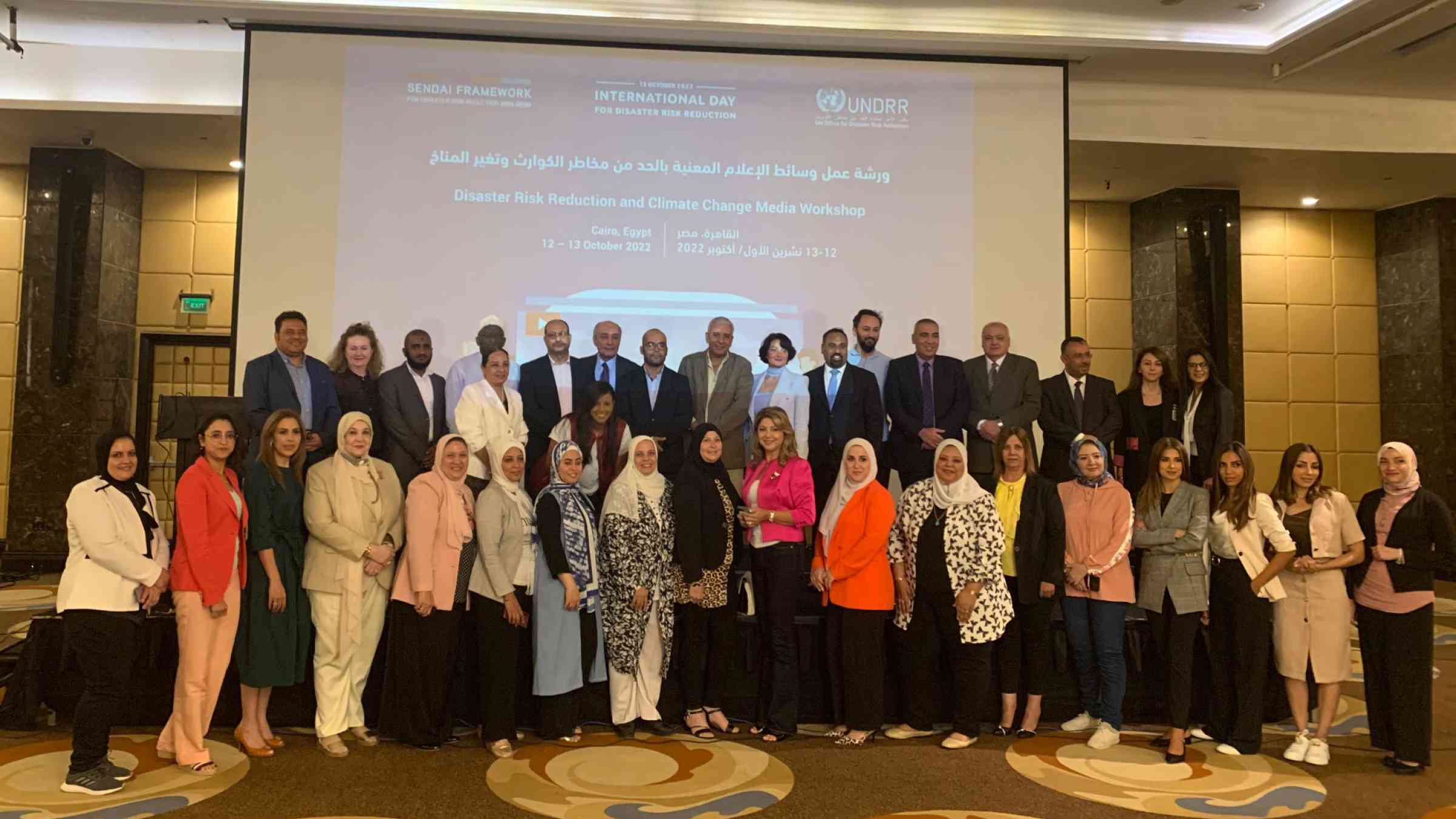Launching of the Arab Media Network for Disaster Risk Reduction and Climate Change Adaptation

Journalists and Media Professionals Contributing to Promoting Disaster Risk Reduction and Climate Change Action
Cairo, 13 October 2022 – The United Nations Office for Disaster Risk Reduction (UNDRR), Regional Office for Arab States, in cooperation with the Pacific Broadcasting Union and the Arab States Broadcasting Union, launched the Arab Media Network for Disaster Risk Reduction and Climate Change Adaptation during the two-day Disaster Risk Reduction and Climate Change Media Workshop, which came to advance the media capacity in the Arab Region in understanding, reporting, and supporting the DRR’s fundamental concepts and interlinkage with climate change, in alignment with the Sendai Framework for Disaster Risk Reduction and National Strategies for Disaster Risk Reduction. The workshop saw the participation of representatives of local and regional media outlets and UN agencies.
40 journalists from different Arab countries joined the workshop to form the first member of this Media Network. The workshop was organized in commemoration of the International Day for Disaster Risk Reduction and in line with the preparations of the COP27 and COP28 to be hosted in Sharm El Sheikh, Egypt and Dubai, United Arab Emirates, respectively, with the aim of improving the role of journalists and media professionals in disseminating information before, during, and after disasters of all types, ranging from disasters triggered by natural hazards to human-initiated ones.
“It requires a whole-society effort to ensure that all risk communities are prepared to take action when alerts are issued, and no group is more important in this endeavor than the media,” said Mami Mizutori, Special Representative of the Secretary-General for Disaster Risk Reduction and Head of UNDRR, in her opening remarks. “Journalists and other media professionals play an essential role in educating decision-makers and political leaders about the real nature of disasters and their causes so they can take policy decisions that mitigate future risks and do not turn a hazard into a disaster.” [Watch here]
The Arab Media Network for Disaster Risk Reduction and Climate Change Adaptation is the first media group in the Arab countries concerned with reporting on how to reduce disaster risks and adapt to climate change by changing the mindset or way of thinking in approaching matters, as it calls for a shift from "disaster response” to “disaster management” to mitigate the level of fragility that makes communities more vulnerable to risks and therefore to disasters. Currently, the media coverage appears to be post-disaster. The network comes to emphasize the role of journalists in setting priorities and influencing policies and community behavior, in order to save lives and serve the public interest. The network will also work to enhance the role of journalists as observers of government practices in the event of failures in precautionary measures or in responding to risks and reducing disaster risks. Investigations, investigative reports, and other types of press coverage, if presented with a high level of professional and ethical standards, contribute to the development of systems adopted to deal with risks and disasters, and raise the level of limiting these risks and their damages in the future.
Over two days, the workshop promoted a clear vision among local and regional media representatives from Arab countries of the linkage between disaster risk reduction in coherence with climate change action and Sustainable Development Goals. It highlighted their role in disseminating information before, during, and after disasters of all types and in stimulating public awareness of the urgent need for disaster reduction, making disaster risk and environmental issues more visible, such as the impact of climate change, and strengthening society's perception of the most pressing threats and give a voice to people who face these threats. The workshop addressed the challenges facing media organizations in providing comprehensive and effective coverage of COP27 in Sharm El-Sheikh and resulted in the drafting of a set of recommendations for COP 28 media coverage.
This year, the International Day for Disaster Risk Reduction focuses on Target G of the Sendai Framework: “Substantially increase the availability of and access to multi-hazard early warning systems and disaster risk information and assessments to people by 2030.”